高一英语Unit1《Festivals around the world》Reading课件
高中英语《Unit 1 Festivals around the world》教案
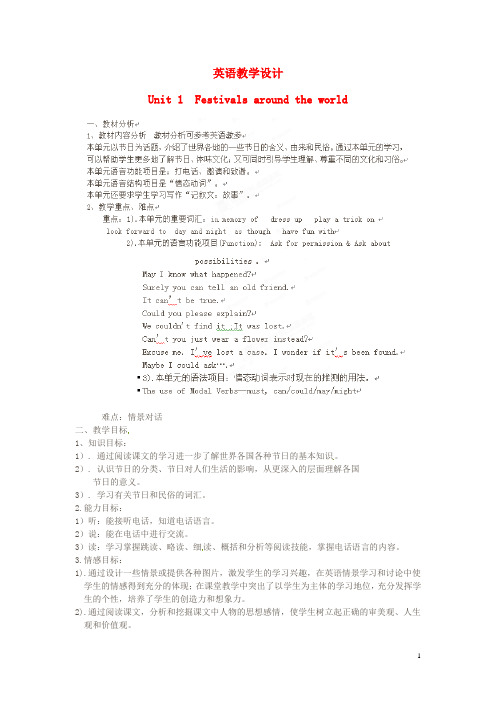
英语教学设计Unit 1 Festivals around the world难点:情景对话二、教学目标1、知识目标:1). 通过阅读课文的学习进一步了解世界各国各种节日的基本知识。
2). 认识节日的分类、节日对人们生活的影响,从更深入的层面理解各国节日的意义。
3). 学习有关节日和民俗的词汇。
2.能力目标:1)听:能接听电话,知道电话语言。
2)说:能在电话中进行交流。
3)读:学习掌握跳读、略读、细读、概括和分析等阅读技能,掌握电话语言的内容。
3.情感目标:1).通过设计一些情景或提供各种图片,激发学生的学习兴趣,在英语情景学习和讨论中使学生的情感得到充分的体现;在课堂教学中突出了以学生为主体的学习地位,充分发挥学生的个性,培养了学生的创造力和想象力。
2).通过阅读课文,分析和挖掘课文中人物的思想感情,使学生树立起正确的审美观、人生观和价值观。
4.教学策略:1).开放式教学策略。
以有限的课堂为载体,给学生提供足够的空间,充分发挥学生的想象力,培养学生的创新能力.如:brainstorm, role playing, given situation, acting 等活动。
2).任务型活动策略。
在做中学和练,任务明确,活动面广,使学生在交际中真实运用所学知识。
3). 循序渐进和梯度分明的教学策略。
教学活动由易到难,由简到繁,给有困难的学生搭建一个平台,让学习有能力的学生“跳一跳”摘到果子。
5.学习策略:1).在学习中借助联想,根据情景等非语言信息进行理解和表达。
2).在听、读过程中,能根据情景和上下文猜测词义或推测每一幕的大意。
3).能根据所接触语言材料中的语言规律加以总结和归纳。
6.文化意识:1).学习和了解中外节假日。
2).通过学习、分析世界节假日形成的原因。
3).通过中外节假日的对比,加深对中国节假日的理解。
三、教学原则1.以任务型教学作为课堂教学的设计理念,强调教学方法的灵活性和多样性。
具体采用情景教学法(Situational Approach)、整体语言教学法(Whole Language Teaching)和交际法(Communicative Approach)等教学方法,学习者通过自学、讨论、交流、询问、演练等各种形式来学习并掌握语言,从而使语言的学习既富有成效,又多姿多彩。
高中英语 Unit 1 Festivals around the world Period Thr

2016-2017学年高中英语Unit 1 Festivals around the world Period Three Grammar & Writing课时作业新人教版必修3编辑整理:尊敬的读者朋友们:这里是精品文档编辑中心,本文档内容是由我和我的同事精心编辑整理后发布的,发布之前我们对文中内容进行仔细校对,但是难免会有疏漏的地方,但是任然希望(2016-2017学年高中英语Unit 1 Festivals around the world Period Three Grammar & Writing课时作业新人教版必修3)的内容能够给您的工作和学习带来便利。
同时也真诚的希望收到您的建议和反馈,这将是我们进步的源泉,前进的动力。
本文可编辑可修改,如果觉得对您有帮助请收藏以便随时查阅,最后祝您生活愉快业绩进步,以下为2016-2017学年高中英语Unit 1 Festivals around the world Period Three Grammar & Writing课时作业新人教版必修3的全部内容。
Period Three Grammar & WritingPart One Grammar用适当的情态动词填空1.He shall have the book when I finish reading.2.Even an experienced teacher can make mistakes.3.Let’s speed up。
They might be waiting for us now.4.You can’t be hungry already—you had lunch only two hours ago!5.Would you please post the letter for me?6.-Must I finish the work today?-No,you needn't.7.Drivers mustn’t drive after drinking。
Unit-1-Festivals-around-the-world-课文知识点解析1
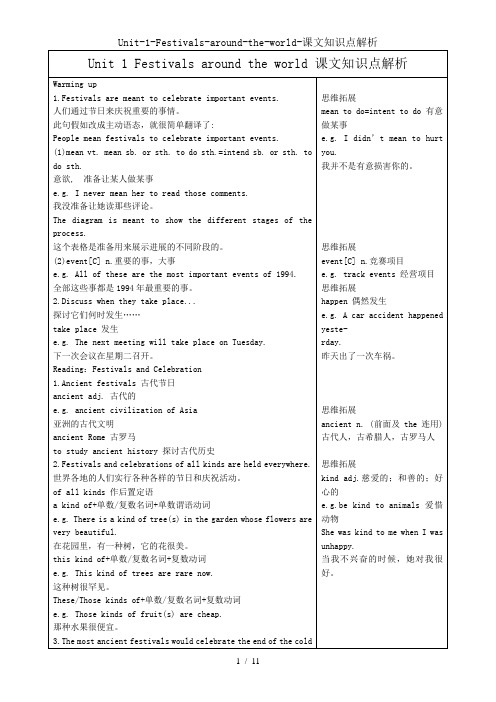
7....when people should go to clean the graves and light incense in memory of their ancestors.
……这时候,人们去扫墓,点上香火祭祀祖先。
memory[ C usually plura] n. 表示所记住的事情,记忆
starve vt.&vi. 挨饿,饿死
e.g. Thousands of people will starve if food doesn’t reach the stricken city.
假如食物无法到达这座受灾的城市,成千上万的人将会饿死。
5.They lit fire and made music because they thought these festivals would bring a year of plenty.
他们把食物, 鲜花和礼物献给死者。
offer sth. to sb.= offer sb.sth.供应某物给某人
e.g. He offered me 300 dollars for that television.
他出300美元向我买那部电视机。
12.The festival of Halloween had its origin as an event in memory of the dead.
万圣节起源于纪念已逝的人们。
had its origin as an event 起源于某事
have your or its origin=begin 开始
e.g.Many of the problems had their origin in post-war Europe.
高中英语《unit1 Festivals around the world》优质课教案、教学设计

Unit 1 Festivals around the world----Festivals and celebrations (Reading I)一、Teaching material(教材分析)This period is the 2nd of the unit and the key part. The topic of the reading passage is about festivals and celebrations. The students will be asked to finish pre-reading, reading and comprehending within one period. All the materials and exercises are about festivals. Through reading, the Ss are supposed to learn different kinds of the festivals.二、Teaching aims(教学目标)Knowledge aim:Enable students to learn more about festivals and celebrations.Ability aim:Enable students to review and strengthen some reading skills such as: task1 and task2 .Emotional aim:Enable students to become interested in festivals and celebrations.三、Difficulties and importances(重点难点)1.Enable the students to understand the article and master the new reading skills of solving some problems like guessing new words,inferring, and understanding the tone of the passage.2.Enble the students to learn to finish a mind map of the passage.四、Learning analysis(学情分析)The class is given to senior one student who has mastered a certain amount of English words and phrases as well as acquired some usefulreading strategies. However they still have difficulty in dealing with some problems concerned with guessing new words, inferring, and understanding the tone of the passage.五、Teaching methods(教学方法)Co-operative learning task-based discussion六、Teaching aids(教学手段)利用多媒体一体机、网络资源、自制音像等创设教学情景、问题情景,扩大教学容量,增强教学的趣味性和时效性.七、Teaching procedures 教学过程Step1:checking(检查)Ask the students to recite some sentences we have learned.(设计意图:巩固检查,加强学生的记忆能力.)Step2:Pre-reading1.Play the games to guess what the video and the picture are about.2.Through some questions to lead into this passage.(Do you know what this is?Can you name some festivals? Any other festivals?---)What is festivals and celebrations?(设计意图:通过图片、视频展现对节日的介绍,以及问题引领,让学生更直观的了解什么是节日,旨在导入新课,提高学生的兴趣.)Step3:Learning aims(学习目标)1.To learn the passage by skimming, scanning and careful reading (reading skills).2.To learn something about different festivals and celebrations around the world.3.to learn to deal with the problems in groups.(设计意图:旨在明确目标,当堂达标.)Step4:Reading(阅读)Task1:Fast reading:The passage is mainly about different and the of celebrations and also the why people celebrate them all over the world.Task2:Enjoy the video 、listen carefully and finish Ex.1Task :Enjoy the video and fill in the chart according to the text.(设计意图:播放课文视频,以优美的声音和图片介绍本节课,提高学生的兴趣. 通过本题,旨在培养学生快速阅读课文的能力.)Task3:Careful readingTo know some details about the passage. Pay attention to the key verbs . Then describe it with them.How do people celebrate each festival?Para2. Festivals of the Dead.1.Key verbs:2. DescriptionPeople are going to clean the graves and light incense in memory of their ancestors.They also light lamps and play music because they think that this will lead the ancestors back to the earth.-------Para3. Festivals to Honour PeopleMatch the festivals with the proper people.Para4. Harvest FestivalsAre harvest festivals always happy events?Harvest festivals are always happy events because people are (thankful) that food is gatheredfor the winter and (农活) is over .How do people celebrate the festivals (key verbs)?Para5. Spring FestivalsWhat do people usually do at Spring Festival?Chinese People usually eat and give children . There are and ,and families celebrate the together.Some Western countries have ,including and dances in the streets , loud music and colorful.(设计意图:细读全文,提高学生的兴趣. 通过本题,旨在培养学生提炼细节,掌握关键词,提高阅读课文的能力.)Step4:Deeply thinkingWhat did people celebrate in the ancient times?What origins do the today’s festivals have?The differences between ancient times and today.Dong Ping Rape Flowers Festival (东平油菜花节)(设计意图:发散思维,不仅仅限于课本,还可以跳出课本,拓展自己的视野,各抒己见,通过本题,旨在培养学生语言表达的能力.)Step5:DiscussionIn groups to talk about the questions about Traditional festivals and Western festivals.Should we, Chinese students, celebrate western festivals like Christmas?AnswersYes NO(设计意图:小组讨论,合作学习,旨在培养学生对我们祖国河山的热爱和传统文化知识的传承,摈弃外国洋节,端正自己的价值观、人生观.)Step6:SummaryThere are all kinds of festivals and around the world, which are held for different reasons. The were mainly held at three times a year--- the end of the cold winter, planting in spring and harvest in autumn.Some festivals are held to the dead or satisfy and the in case they might , while other festivals are held to honor famous people or the gods, such as and Columbus Day. (设计意图:总结知识,当堂达标。
高一英语Unit1 Festivals around the world课件 新课标 人教版 必修
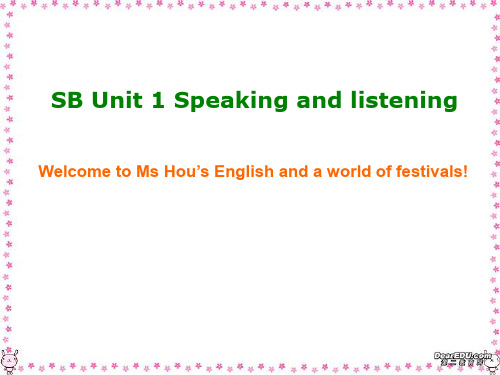
Listening task 2
Listen for details.
Listening strategies:
1. Try to get some background knowledge of the listening task.
3.How long did their holiday last?
Listening task 1
Easter at Home
1.What did Helen and Andy buy for Easter? Some candy eggs and Hot Cross Buns.
2.What was hidden all around the house? Chocolate Easter eggs.
While-listening : Task 2
Listen for details.
What do people do at the festivals?
Halloween:
Children in western countries _d_r_e_s_s_ _u_p_in costumes and go to their n_e_i_g_h_b_o_u_r_s_’ homes. They _a_s_k__ ___f_o_r_ _s_w__e_e_ts__and might __p_l_a_y_ _t_ri_c_k_s_ if they do not get some.
Pre-listening : Task 1
Obon Day of the Dead
Festivals of the Dead
高中英语 Unit1《Festivals around the world》课件 新人教版必修3
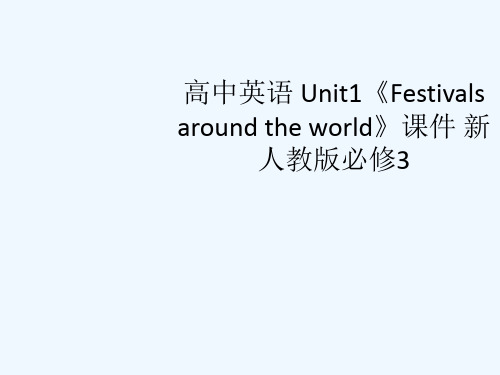
Dragon Boat Festival
China
Columbus Day
USA
National Festival
India
Par4
Why are autumn festivals happy Peeovpelentasre? grateful for the harvest / for the
It is the birthday of Jesus Christ
Go to the parties and churches , give cards and presents to our friends and relatives
Valentine’s Day
In February
People send roses and cards to the people they love.
on the first day of the lunar year last fifteen days
do spring cleaning , decorate their houses
On New Year’s Eve, dinner, watch the Spring Festival programme, watch fireworks, set off firecrackers
You are given 5 minutes to read the passage quickly and try to remember different kinds of festivals mentioned in the text.
Task 1
Obon Day of the Dead
get lucky money Lantern Festival
《高中英语新课标-必修1-Unit1 Festivals around the world 课件》
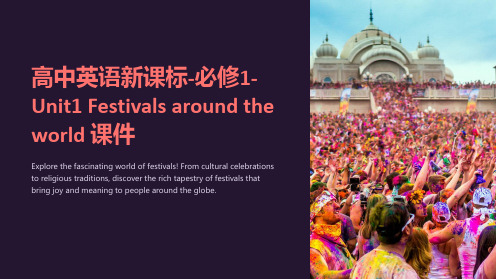
不同国家和文化中的节日
了解世界各国和不同文化中的庆典与节日,体验不同人群庆祝节日的方式, 感受文化的多样性与人类共同的欢庆。
节日的文化意义
探究节日在不同文化中的重要地位,了解它们对于文化传统、身份认同和价 值观的深远影响。
节日的历史渊源
追寻节日的历史根源,了解节日与人类历史和传统之间的联系,以及随着时 间推移如何演变和发展。
宗教节日及其意义
探索各大宗教中的重要节日,了解它们在信仰和宗教-必修1Unit1 Festivals around the world 课件
Explore the fascinating world of festivals! From cultural celebrations to religious traditions, discover the rich tapestry of festivals that bring joy and meaning to people around the globe.
为什么庆祝节日?
了解不同文化中庆祝节日的原因,从人们的欢乐和团结之中体会为什么庆祝节日的重要性。
世界各地不同类型的节日
探索世界各地独特的节日,从传统文化节日到现代庆典,领略各种不同类型 的节日给人们带来的喜悦与意义。
节日 - 生活的庆祝
了解节日作为人们庆祝与享受生活的方式,体验节日带来的喜庆氛围与人们 团聚的温暖。
《高一英语课件:Unit1Festivalsaroundtheworld》
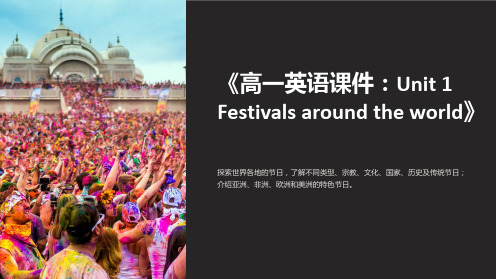
4 Historical Festivals
Reenacting or remembering historical events or periods.
Festivals aroundthe world
1
China: Spring Festival
Experience the awe-inspiring
Holi
Join the fun-filled festivities of colors, water balloons, and joyous dances during the Festival of Spring.
Raksha Bandhan
Experience the bond of love and protection between brothers and sisters through tying of rakhi.
2 ReligiousFestivals
Observing and honoring religious beliefs and significant events.
3 National Festivals
Commemorating national achievements, independence, or important historical moments.
Reasons for Celebrating Festivals
1 CulturalPreservation
Preserve and pass down cultural traditions, customs, and rituals to future generations.
2 Community Bonding
《高一英语课件:Unit1Festivalsaroundtheworld》

Dragon Boat Festival
Racing Tradition
This lively festival features exciting dragon boat races, where teams paddle in synchronized harmony.
Delicious Dumplings
Festivals are not just celebrations; they are an integral part of cultural identity, promoting joy, unity, and respect for traditions. They bring communities together, fostering a sense of belonging and preserving heritage for future generations.
Mooncakes, with their various fillings, represent unity, harmony, and sharing blessings.
3
Lantern Displays
Elaborately crafted lanterns light up the night, creating a magical atmosphere of joy and wonder.
Enjoying outdoor activities and appreciating chrysanthemums are common traditions during Double Ninth Festival.
3 AuspiciousGifts
Gifting chrysanthemum-themed items symbolizes health, longevity, and wards off evil spirits.
高一英语festivals around the world
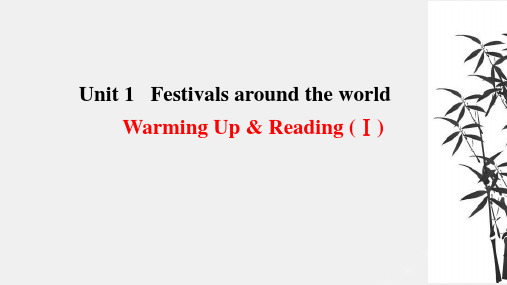
1. How many festivals do you know both in China and worldwide?
Chinese Festivals
Spring
…
Festival
Lantern Festival
Chinese Festivals
The Double Ninth Day
Youth Day
5. Compare the festivals of the dead in Mexico, Japan and China. What things are similar? What things are different?
The Chinese, Japanese and Mexican festivals of the dead all have customs to honor the dead. The Chinese and Japanese go to clean their ancestors’ graves, and the Mexicans offer food, flowers and gifts to the dead. However, there are some differences. The Mexicans eat special food that looks like bones, something the Chinese and Japanese do not do.
Valentine’s Day
Christmas
2. Do you know these festivals?
Chinese Festivals
Spring Festival
Lantern Festival January 15
高一英语Unit 1 Festivals around the world (1) 人教实验版知识精讲
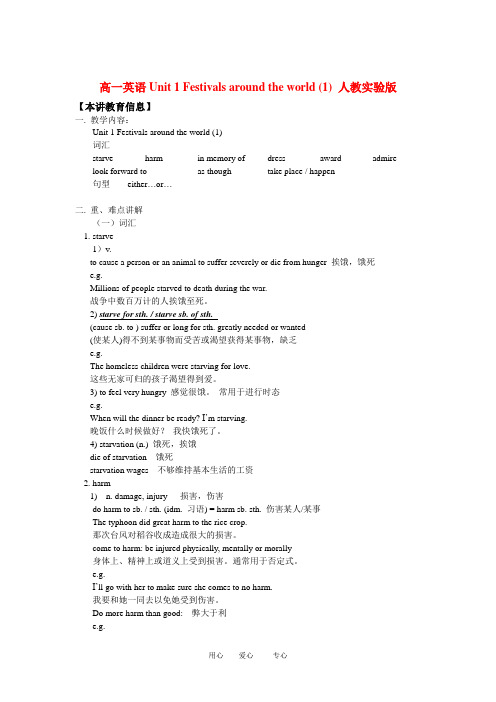
高一英语Unit 1 Festivals around the world (1)人教实验版【本讲教育信息】一. 教学内容:Unit 1 Festivals around the world (1)词汇starve harm in memory of dress award admire look forward to as though take place / happen句型either…or…二. 重、难点讲解(一)词汇1. starve1)v.to cause a person or an animal to suffer severely or die from hunger 挨饿,饿死e.g.Millions of people starved to death during the war.战争中数百万计的人挨饿至死。
2) starve for sth. / starve sb. of sth.(cause sb. to ) suffer or long for sth. greatly needed or wanted(使某人)得不到某事物而受苦或渴望获得某事物,缺乏e.g.The homeless children were starving for love.这些无家可归的孩子渴望得到爱。
3) to feel very hungry 感觉很饿。
常用于进行时态e.g.When will the dinner be ready? I’m starving.晚饭什么时候做好?我快饿死了。
4) starvation (n.) 饿死,挨饿die of starvation 饿死starvation wages 不够维持基本生活的工资2. harm1) n. damage, injury 损害,伤害do harm to sb. / sth. (idm. 习语) = harm sb. sth. 伤害某人/某事The typhoon did great harm to the rice crop.那次台风对稻谷收成造成很大的损害。
Unit1Festivalsaroundtheworld(新课标版高一英语必修三教案教学设计)

Unit 1 Festivals around the world(新课标版高一英语必修三教案教学设计)Unit 1 Festivals around the worldThe First Period (Warming up & Pre-reading)Step One: Lead-inFree Talk: Did you have a good time in your winter holidays?When did you feel most happy and excited? Why?( At the Spring Festival. Because it's the most important festival in our country....)Step Two: Warming up1. Let the Ss think about the other Chinese festivals.( Lantern Festival, Pure Brightness Festival, Dragon Boat Festival, Mid-Autumn Festival, New Year's Day, Chung Yeung Festival....)2. Discussion One1)Let the Ss look at the information about Chinese festivals and discuss another four Chinese festivals according to the example in warming up: When does the festival come?What do people celebrate?What do people do?Festivals Date festivals DateNew Year January1st Teachers' Day September 10thInternational Women's Day March 8 National Day October 1stArbor Day March 12th The Spring Festival Lunar New Year International labor Day May 1st Dragon Boat Festival the fifth day of the fifth lunar monthInternational Children's Day June 1st Mid-Autumn Festivalthe 15th day of the 8th lunar monthArmy Day August 1st Lantern Festival the 15th day of the 1st lunar monthChinese Youth Day May 4th Pure Brightness Day April the fifth2) Let the Ss fill in the form in the warming up and ask some to share their opinions with the whole class.3 Discussion TwoTalk about some foreign festivals.( Christmas, April Fools Day, Easter Day, Halloween, Valentine's Day, Thanksgiving Day, Obon...)Step three: Pre-readingLet students think about the questions:1) What is your favourate holiday of the year? Why?2)What festivals or celebrations do you enjoy in your city or town? Do you like spending festivals with your family or with friends? What part of a festival do you like best- the music, the things to see, the visits or the food?Step Four: Language Points1.mean to do 打算做某事mean doing 意味着….I never meant him to work for us.Passing the entrance examination means being admitted into college.2. celebrate vt.(1) do sth to show that a day or an event is important 庆祝;祝贺celebrate Christmas / one’s birthday / a wedding anniversary / a victory(2) praise and honor 赞扬;称颂The names of many heroes are celebrated by the poets.词语辨析:celebrate, congratulatecelebrate后常接日期、事情或场合。
高中英语 Unit 1 Festivals around the world Period 1 Wa
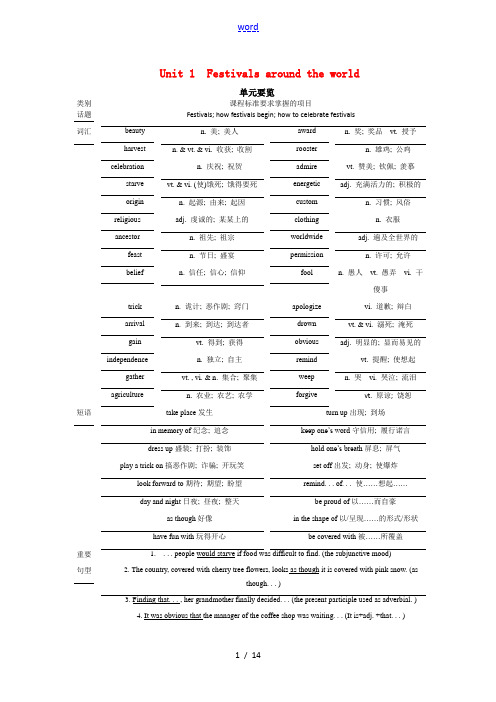
Unit 1 Festivals around the world单元要览类别课程标准要求掌握的项目话题Festivals; how festivals begin; how to celebrate festivals词汇beauty n. 美; 美人award n. 奖; 奖品vt. 授予harvest n. & vt. & vi. 收获; 收割rooster n. 雄鸡; 公鸡celebration n. 庆祝; 祝贺admire vt. 赞美; 钦佩; 羡慕starve vt. & vi. (使)饿死; 饿得要死energetic adj. 充满活力的; 积极的origin n. 起源; 由来; 起因custom n. 习惯; 风俗religious adj. 虔诚的; 某某上的clothing n. 衣服ancestor n. 祖先; 祖宗worldwide adj. 遍及全世界的feast n. 节日; 盛宴permission n. 许可; 允许belief n. 信任; 信心; 信仰fool n. 愚人vt. 愚弄vi. 干傻事trick n. 诡计; 恶作剧; 窍门apologize vi. 道歉; 辩白arrival n. 到来; 到达; 到达者drown vt. & vi. 溺死; 淹死gain vt. 得到; 获得obvious adj. 明显的; 显而易见的independence n. 独立; 自主remind vt. 提醒; 使想起gather vt. , vi. & n. 集合; 聚集weep n. 哭vi. 哭泣; 流泪agriculture n. 农业; 农艺; 农学forgive vt. 原谅; 饶恕短语take place发生turn up出现; 到场in memory of纪念; 追念keep one’s word守信用; 履行诺言dress up盛装; 打扮; 装饰hold one’s breath屏息; 屏气play a trick on搞恶作剧; 诈骗; 开玩笑set off出发; 动身; 使爆炸look forward to期待; 期望; 盼望remind. . . of. . . 使……想起……day and night日夜; 昼夜; 整天be proud of以……而自豪as though好像in the shape of以/呈现……的形式/形状have fun with玩得开心be covered with被……所覆盖重要句型1. . . . people would starve if food was difficult to find. (the subjunctive mood)2. The country, covered with cherry tree flowers, looks as though it is covered with pink snow. (asthough. . . )3. Finding that. . . , her grandmother finally decided. . . (the present participle used as adverbial. )4. It was obvious that the manager of the coffee shop was waiting. . . (It is+adj. +that. . . )5. “. . . I don’t want them to remind me of her. ” So he did. (So+S. +do/does/did. )6. There was Hu Jin waving at him and calling, . . . (Inversion)功能 1. Making phone callsMay I speak to. . . ?Can I ring/call back later?Hold/Hang on, please.I’ll ring him/her up again.Just a moment, please.Sorry, he/she isn’t here right now.2. InvitationsI wonder if you are interested in. . . .I’d like to invite you to. . . .Would you like. . . ?Could/Would you please. . . ?I’m looking forward to. . . .I’d love to, but. . . .3. ThanksThank you so much.Thanks a lot.That’s very kind of you.You’re most wele.Don’t mention it.It’s a pleasure.语法The use of can, could, may, might, will, would, shall, should, must, can’t1. can and couldJin can speak English well. (ability)Could you please show me the way to BeihaiPark? (request)2. may and mightMay we see the awards for the teams? (permission; request)She might give you some new clothing. (possibility)3. will and wouldThe Spring Festival is the most fun. The whole family will e for dinner. (promise; agreement)Often he would dress up like a rich man. (past habit; custom)4. shall and shouldThe harvest festival begins on Sunday. We shall be there with our friends. (promise; agreement)You should arrive at the airport two hours before he goes. (advice)5. must and can’tWang Feng wins an award every year. He must be very strong. (speculation)You must be joking. That can’t be true. (guessing)教学重点1. Get students to know about festivals around the world.2. Have students learn some useful new words and expressions about festivals and customs and letthem learn effective ways to remember English vocabulary.3. Enable students to grasp and use the expressions of request and thanks.4. Let students learn the new grammar item: the use of can, could, may, might, will, would, shall,should, must and can’t.5. Develop students’ listening, speaking, reading and writing abilities.教学难点1. Enable students to master the use of can, could, may, might, will, would, shall, should, must andcan’t.2. Let students learn to write a different ending of a story.3. Develop students’ integrative skills.课时安排Periods needed: 7Period 1 Warming up and readingPeriod 2 Learning about language: Important language pointsPeriod 3 Learning about language: GrammarPeriod 4 Using language: Listening and speakingPeriod 5 Using language: Extensive readingPeriod 6 Using language: Speaking and writingPeriod 7 Revision: Summing up and learning tipPeriod 1Warming up and reading整体设计教材分析This is the first teaching period of this unit. At the beginning of the class, the teacher can leadin the topic of the unit by having a free talk with students about their winter holidays and the Spring Festival.The Warming Up is intended to have students start thinking about the variety of events and festivals that are celebrated in China, and connect them with seasons of the year and reasons for the celebrations. The teacher can use this part to introduce information that Chinese students should have about their country’s cultural events.The Pre-reading is a continuation of the Warming Up and it moves the discussion to a more personal level. It is intended to help students enter imaginatively into a discussion of festivals and their importance to the society. It also directs their attention to the variety of events and activitiesthose festivals include. The teacher should let students discuss the questions and predict what kind of information will be introduced in the Reading.The reading passage titled FESTIV ALS AND CELEBRATIONS briefly describes the earliest kinds of festivals with the reasons for them, and then four different kinds of festivals that occur in most parts of the world. Encourage students to look at the pictures and the heading of each section to guess what the text might be about. Then let them skim for the general idea for each section, and scan for further understanding. Because this passage introduces a lot of useful new words and expressions which are only used for festivals, in order not to let students feel much difficult, the teacher should deal with any language problems while they are reading. After reading, students are required to do the four exercises in the prehending to see how much they have understood the reading passage. The teacher can first let them work in pairs or in groups to find the answers cooperatively, and then check their answers with the whole class.To consolidate the contents of the reading passage, students should be required to talk about festivals in their own words at the end of the class. In order to arouse students’ interest, the teacher can hold a petition between groups.教学重点1. Let students learn more about history and basic knowledge of festivals.2. Get students to learn different reading skills.教学难点1. Develop students’ reading ability.2. Enable students to talk about festivals and celebrations.三维目标知识目标1. Get students to learn the useful new words and expressions in this part: beauty, harvest, starve, origin, religious, ancestor, Mexico, feast, bone, belief, poet, arrival, gain, independence, gather, agriculture, award, rooster, admire, energetic, Easter, clothing, Christian, custom, takeplace, in memory of, dress up, play a trick on, look forward to, day and night, as though, have fun with2. Let students learn about history and basic knowledge of festivals both in and out of China.能力目标1. Develop students’ reading ability and let them learn different reading skills.2. Enable students to talk about festivals and celebrations.情感目标1. Stimulate students’ love for their own national culture and customs.2. Develop students’ sense of cooperative learning.教学过程设计方案(一)→Step 1 Leading-inHave a free talk with students. Ask them the following questions:Did you have a good time in your winter holidays?When did you feel most happy and excited? Why?(At the Spring Festival. Because it’s the most important festival in our country. . . )→Step 2 Warming up1. Let students brainstorm the other Chinese festivals.(Lantern Festival, Pure Brightness Festival, Dragon Boat Festival, Mid-Autumn Festival, New Year’s Day, Chung Yeung Festival. . . )2. Let students read the information about Chinese festivals below and discuss another three Chinese festivals:When does the festival e?What do people celebrate?What do people do?Festivals Date Festivals DateNew Year January 1st Teachers’ Day September 10th International Women’sDayMarch 8th National Day October 1st Arbor Day March 12th The Spring Festival Lunar New Year International Labor Day May 1st Dragon Boat Festival the fifth day of the fifth lunar month International Children’sDayJune 1st Mid-Autumn Festival the 15th day of the 8th lunar month Army Day August 1st Lantern Festival the 15th day of the 1st lunar month Chinese Youth Day May 4th Pure Brightness Day April the fifth3. Ask students to fill in the following form and ask some to share their opinions with the whole class. The first one is given as an example.Festivals Time of year/date What it celebrates What people doMid-Autumn Festival autumn/fall the beauty of the fullmoon, harvest, time withfamily and friends give/eat moon cakes and watch the full moon with family and friends4. Talk about some foreign festivals with students.(Christmas, April Fools’ Day, Easter, Halloween, Valentine’s Day, Thanksgiving Day, . . . )→Step 3 Pre-reading1. Let students discuss the following questions:What festivals or celebrations do you have in your city or town? What part of a festival do you like best—the activities, the music, the sights, the food or the people who visit?2. Ask students to look at the pictures and title of the passage in Reading. Discuss in pairs what kind of information will be introduced in the passage.→Step 4 Reading1. Fast readingAsk students to skim the reading passage and then fill in the following chart.Kinds of Festivals Names of Festivals Countries FestivalsFestivalsHarvestSpring(Let students look through the chart and then read the text silently. Three minutes later, check the answers with the whole class. Show the suggested answers on the screen. )2. Intensive readingAllow students to read carefully this time to understand the main ideas of each paragraph and the important details, and then finish the following:1)Choose the best answer to each question or to finish each sentence according to the text.(1)Why do Japanese people light lamps during the Festival of the Dead?A. Because they want to make the festival colorful.B. Because they want to light up their rooms.C. Because they want to light up their way.D. Because they want to lead their ancestors to return to earth.(2)Which of the following was not mentioned as a famous person in the text?A. Mohandas Gandi.B. Christopher Columbus.C. Abraham Lincoln.D. Qu Yuan.(3)The place where people will usually decorate churches and town halls with flowers and fruits is ______________.A. IndiaB. AmericaC. EuropeD. China(4)Easter is held in memory of the return of Jesus for Christians and also celebrates ______________.A. the ing of springB. the autumn harvestC. the Lunar New YearD. the end of a yearSuggested answers: (1)D(2)C(3)C(4)A2)Use the information from the reading passage to answer the following questions.(1)What are festivals of the dead usually for?(2)What makes autumn festivals happy events?(3)What do people usually do at spring festivals?(4)What is one important reason to have festivals and celebrations?(5)pare the festivals of the dead in Mexico, Japan and China. What things are similar? What things are different?3. Reading and discussionRead the text a third time and then work in pairs to do the following.1)Based on the reading passage, what do most festivals seem to have in mon? Why do you think these things might be important to people everywhere? Talk with your partner and fill in the chart below.Three mon things Reasons why they are important to people everywhere1.2.3.2)Discuss in pairs which festivals you think are the most important and which are the most fun. Then fill in the chart with your ideas.Type of festival Example of festival Reasons for your choice Most importantMost fun(Let students have enough time to read the passage carefully and discuss the questions and charts with their partners. Encourage them to expand their answers according to their ownexperiences. )4. ExplanationHelp students analyze some difficult, long and plex sentences and guess the meanings of some new words. Encourage them to try to deal with the language points in the context.Discuss the following important sentences and phrases in the passage.1)Some festivals are held to honour the dead, or to satisfy the ancestors, who might return either to help or to do harm.2)in memory of3)India has a national festival on October 2 to honour Mohandas Gandhi, the leader who helped gain India’s independence from Britain.4)People are grateful because their food is gathered for the winter and the agricultural work is over.5)The most energetic and important festivals are the ones that look forward to the end of winter and to the ing of spring.6)The country, covered with cherry tree flowers, looks as though it is covered with pink snow.Suggested explanations:1)The sentence contains a non-restrictive attributive clause who might return either to help or to do harm. It means people hold some festivals either to show respect to the dead or to make their ancestors happy in case they might e back to do harm.2)in memory of: serving to recall sb. , to keep him fre sh in people’s mindsHe wrote a poem in memory of his dearest wife, who died in an accident.in honor of: showing great respect or high public regard3)the leader who helped gain India’s independence from Britain: a noun phrase followed by an attributive clause as the appositive4)two clauses for reason5)energy n. → energetic adj. : full of or done with energylook forward to: “to” is a preposition here.I’m looking forward to hearing from you.be devoted to; be/get used to; get down to; stick to. . .6)co vered with cherry tree flowers: a past participle phrase equal to “which is covered with cherry tree flowers”as though: as ifHe talks as though he knew all about it.He looks as if he had seen a ghost.5. Reading aloud and underliningAsk students to read the passage aloud to the tape and let them pay attention to the pronunciation of each new word and the pauses within each sentence. Tell them to pick out all the useful expressions or collocations from the passage while reading and copy them to the notebook after class as homework.→Step 5 ConsolidationAsk students to talk about festivals in their own words according to the text. Then let them plete the following passage with proper words or phrases.There are all kinds of festivals and ______________ around the world, which are held for different ______________. The ancient festivals were mainly held at three times a year—the end of the cold ______________, planting in spring and ______________ in autumn. Some festivals are held to ______________ the dead or ______________ the ancestors, who might return either to help or ______________, while other festivals are held to honor famous people or to the ______________, such as Dragon Boat Festival, Columbus Day, and so on. Harvest and ______________ festivals are happy events because their food is ______________ for the winter and the ______________ work is over, to which Mid Autumn Festival belongs. And the most ______________ and important festivals are the ones that ______________ the end of winter and to the ing of ______________ such as the Lunar New Year, at which people have a very ______________.Suggested answers: celebrations; reasons; weather; harvest; honor; to satisfy; to do harm; gods; Thanksgiving; gathered; agricultural; energetic; look forward to; spring; good time →Step 6 Homework1. Learn the useful new words and expressions in this part by heart.2. Read the reading passage again and again and try to talk about festivals both in and out of China.设计方案(二)→Step 1 Leading in the topic by learn ing vocabulary about festivals1. Make a circle on the blackboard and write the word “FESTIV AL” in it.2. Ask students, “We have learned ‘festival’. Can you name some festivals? ”3. Students list as many festivals as possible. Then the teacher adds some s tudents can’t think of, such as Halloween, Easter, Thanksgiving, Valentine’s Day.4. Let students read them aloud and try to learn them by heart.→Step 2 Warming up by talking about festivalsWork in groups and list three more Chinese festivals that you know. Discuss when they take place, what they celebrate and what people do at that time. Then tell the group which festival is their favorite and why.Festivals Time of year/date What it celebrates What people doMid-Autumn Festival autumn/fall the beauty of the fullmoon, harvest, time withfamily and friends give/eat moon cakes and watch the full moon with family and friends→Step 3 Predicting by looking and discussing1. Look at the pictures and title of the reading passage and discuss in pairs what the passage might be about.2. Two or three students are to give their opinions.→Step 4 Reading1. Give students 2 minutes, and ask them to skim the passage for information to tell if the following sentences are True or False.1)The ancient p eople needn’t worry about their food. (F)2)Halloween used to be a festival intended to honor the dead. (T)3)Qu Yuan was a great poet who people honor a lot in China. (T)4)The Mid-autumn Festival is held to celebrate the end of autumn. (F)5)Easter celebrates the birth of Jesus. (F)2. Give students 5 minutes to read the passage carefully, and plete the chart according to the passage.Festivals of the Dead Obon in Japan___________________HalloweenFestivals to Honor People ________________________________A national festival in____________Harvest Festivals _________ in European countries_________ in China and JapanSpring Festivals ________________Carnivals in some Western countries________________________________ in Japan3. Listening and reading aloudPlay the tape of the text for students and let them pay attention to the pronunciation of each new word and the pauses within each sentence. Then ask them to read the text aloud to the tape.→Step 5 Closing down by spoken practice1. Have students get prepared in 3 minutes or so and then ask them to talk about festivals and celebrations.2. Ask as many students as possible to have a try in front of the class.→Step 6 Homework1. Go over the text and try to learn all the useful words and expressions in this part by heart.2. Finish the exercises in prehending on Page3.板书设计Unit 1Festivals around the worldFestivals and celebrationsKinds of Festivals Names of Festivals Countries FestivalsFestivalsHarvestSpring活动与探究Group discussion & speechAs is known from the reading passage, festivals of all kinds are celebrated around the world. Most festivals have celebrations that include food, music, clothing and dances. These events originated from some similar ideas, but they take different forms in different regions and societies. What festivals and celebrations do you know all over the world? Have you ever taken part in them and enjoyed yourself? Discuss festivals in groups and then make speeches.Step 1: The teacher divides the class into four groups and gives the tasks to students in each group. Group 1 will list the festivals around the world as many as possible, and then categorize them according to the origins of these festivals. And they should prepare for a short speech. Group 2 will discuss two traditional Chinese festivals and prepare for their presentation. Group 3 will discuss two Western festivals and prepare for their presentation. Group 4 will discuss the differences between Chinese festivals and Western festivals, then contrast and pare their styles, celebrations, dates and so on. And they should prepare for a short speech.Step 2: Groups 1, 2 and 3 give their speeches on the festivals they have discussed. Group 4 gives their speech on the differences between Chinese festivals and Western festivals.Step 3: The teacher makes proper remarks about students’ speeches and sums up the differentcultural practices between China and other countries according to them.。
高一Unit1《Festivalsaroundtheworld》教案人教版(精选范文)

高一Unit1《Festivalsaroundtheworld》教案人教版(精选范文)【高中作文】高一unit 1《festivals around the world》教案人教版本单元为人教版《高中英语》(nsec)必修模块3unit 1. festivals around the world.本单元的中心话题是“谈论世界各地的节日”,该阅读课reading: a pioneer for all people。
是本单元第一课时,内容涉及到各国的节日名称,时间,方式和原因,使学生了解不同国家的文化和风俗。
文章以独立的内容块进行叙述。
文章的结构特点是平行并列。
教学目标知识与技能目标:the students will be able to1. identify the different festivals by comparing the information about celebrations.2. explain the reason why the festivals come into being by finding out the similarities and differences.3. describe their favorite festivals by using the language from the text.教学重点和难点1)为全体学生进行有效性阅读策略的指导,包括语篇分析、猜测词义,逻辑推理、归纳概括等技巧。
2)通过比较信息,归纳总结各国节日产生的原因,推理出人们到对节日的态度和节日的意义。
教学过程教学步骤教学活动设计意图pre-reading: step 1.brainstorm:motivate the ss by asking some questions.q1: do you any festivals around the world?step 2. match the celebration with the festivals.q2: do you know how people celebrate these festivals?do a quiz.step 2. discussionss discuss the following questionsq1: how do they come into being?q2: what do they have in common? and what are there difference among them?问题引发了学生的思考,调动学生的已知,将学生的思维活动引导到课文主题上来。
U1 Festivals around the world
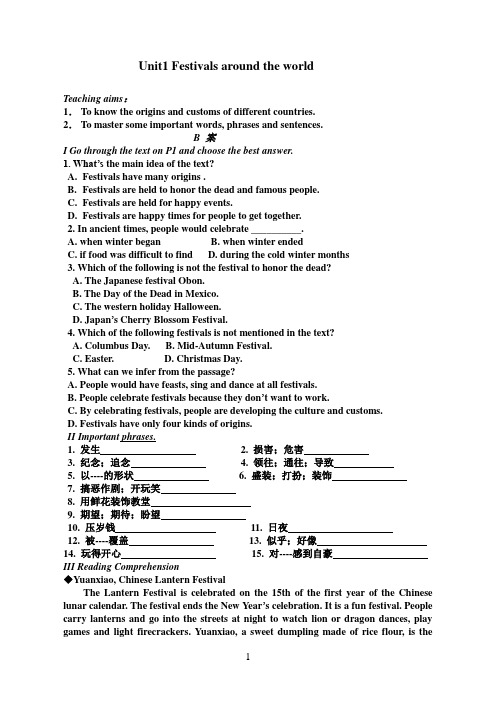
Unit1 Festivals around the worldTeaching aims:1.To know the origins and customs of different countries.2.To master some important words, phrases and sentences.B 案I Go through the text on P1 and choose the best answer.1. What’s the main idea of the text?A.Festivals have many origins .B.Festivals are held to honor the dead and famous people.C.Festivals are held for happy events.D.Festivals are happy times for people to get together.2. In ancient times, people would celebrate __________.A. when winter beganB. when winter endedC. if food was difficult to findD. during the cold winter months3. Which of the following is not the festival to honor the dead?A. The Japanese festival Obon.B. The Day of the Dead in Mexico.C. The western holiday Halloween.D. Japan’s Cherry Blossom Festival.4. Which of the following festivals is not mentioned in the text?A. Columbus Day.B. Mid-Autumn Festival.C. Easter.D. Christmas Day.5. What can we infer from the passage?A. People would have feasts, sing and dance at all festivals.B. People celebrate festivals because they don’t want to work.C. By celebrating festivals, people are developing the culture and customs.D. Festivals have only four kinds of origins.II Important phrases.1. 发生2. 损害;危害3. 纪念;追念4. 领往;通往;导致5. 以----的形状6. 盛装;打扮;装饰7. 搞恶作剧;开玩笑8. 用鲜花装饰教堂9. 期望;期待;盼望10. 压岁钱11. 日夜12. 被----覆盖13. 似乎;好像14. 玩得开心15. 对----感到自豪III Reading Comprehension◆Yuanxiao, Chinese Lantern FestivalThe Lantern Festival is celebrated on the 15th of the first year of the Chinese lunar calendar. The festival ends the New Year’s celebration. It is a fun festival. People carry lanterns and go into the streets at night to watch lion or dragon dances, play games and light firecrackers. Yuanxiao, a sweet dumpling made of rice flour, is thetraditional food eaten during the festival. In Chinese, the festival is named after the dumpling, which is said to represent family unity and happiness because it is sticky, round and sweet.◆Dai Water-Sprinkling FestivalThe Dai minority (少数民族)in Yunnan celebrate the Water-Sprinkling Festival in the middle of April. The festival celebrates the Dai Lunar New Year and lasts for three days. There are dragon races and fireworks displays on the first day and a fair on the second day. At the fair, young lovers throw love pouches to each other. The third day is the actual water-sprinkling day, people splash water on each other to wash away illnesses and bad luck and bring good luck for the coming year.◆Losar, Tibetan New YearLosar, or the Tibetan New Year, is celebrated on the 25th of the 10th month of the Tibetan calendar. The festival lasts for a week and is a time for giving thanks. On the last day of the year, people clean their houses and prepare for the new year. On the 29th of the last month, houses are cleaned, washed and painted as part of the Cutor festival. At dawn on New Year’s Day, Tibetans go to visit holy places and hang flags over their homes. Many families will go for picnics and visit friends and family. The festival lasts well over two weeks, but the first four days are for small family feasts. When the family gathers at home for the New Year celebration, they eat a special bread called tab-zan.1.People eat yuanxiao during the Lantern Festival because _____________.A.it is the traditional foodB.it is deliciousC.it is sticky, round and sweetD.it is made of rice flour2.Which of the following best explains the meaning of the word “fair” in Paragraph2?A.The place where young people get together.B.The time when young people have meetings.C.The time young people to find their lovers.D.The place where young people find their lovers.3.Which of the following won’t people do during Losar?A. Do house cleaning.B. Visit their relatives.C. Visit temples.D. Have dragon races.4. How many days are there in the last month according to Tibetan Calendar?A. 25B. 29C. 30 D 315. What’s the best title of the passage?A. How to celebrate New YearB. Chinese FestivalsC. New Year celebrations in ChinaD. Minority festivals in ChinaC 案Step 1 Fast readingSkim the reading passage and then fill in the following chart.Kinds of Festivals Names of Festivals CountriesFestivals of the Dead 123Festivals to Honor People 123Harvest Festivals 12Spring Festivals 123Step 2 Careful Reading1.When would ancient people hold festivals?2.What are festivals of the dead usually for? What would people do in Japan, Mexicoand the western countries?3.What makes autumn festivals happy events? And what would people do in Europe,China and Japan?4.What do people usually do at spring festivals?5.What is one important reason to have festivals and celebrations?Step 4 Long and difficult sentences.1.Some festivals are held to honor the dead, or satisfy and please the ancestors, whocould return either to help or to do harm.翻译:________________________________________________________________句中的不定式to honor the dead, or satisfy and please the ancestors用作__________ who 引导_______________,修饰________________.2.The most energetic and important festivals are the ones that look forward to theend of winter and to the coming of spring.翻译:_______________________________________________________________句中为避免重复,用the ones代指_____________, that 引导___________从句。
- 1、下载文档前请自行甄别文档内容的完整性,平台不提供额外的编辑、内容补充、找答案等附加服务。
- 2、"仅部分预览"的文档,不可在线预览部分如存在完整性等问题,可反馈申请退款(可完整预览的文档不适用该条件!)。
- 3、如文档侵犯您的权益,请联系客服反馈,我们会尽快为您处理(人工客服工作时间:9:00-18:30)。
celebrate the end of the cold weather, planting in spring and harvest in autumn; celebrate when hunters catch animals.
P 2. Festivals of the Dead Japan -----Obon Mexico------Day of the Dead America------Halloween P 3. Festivals to Honour People Dragon Boat Festival Columbus Day (India)October 2
3. Halloween also had its origin in old beliefs about the return of the spirits of dead people. 万圣节也源自人们古老的信念,认为 亡者的灵魂会返回人间。
origin (n.) : the place or situation in which something begins to exist 起源;由来,可 用做可数名词或不可数名词,通常用作 复数形式
Pre-reading
1. What festivals or celebrations do you have in your city or town? What part of a festival do you like best- the activities, the music, the sights, the food or the people who visit?
Dragon Boat Festival Mid-autumn Day
May 5
August 15
Easter
Thanksgiving Day
around March 22- the last Thursday of
--April 25
November
Halloween October 31
Christmas Day December 25
2. Look at the pictures and title of the passage below. What kind of information you think will be introduced in the passage.
Scanning
How many types of festivals are mentioned in the passage?
Harvest Festivals
长句难句: (supplementary reference materials) 一·补充注释
1 . At that time people would starve if food was difficult to find,especially during the clod winter months .在那个 时代,如果食物难以找到,特别是在 寒冷的冬月,人们就会挨饿。
2. …or satisfy the ancestors , who could return either to help or to do harm. ……或使祖先得到满足,因为祖先 们有可能回到世上(给人们)提供帮 助,也可能带来危害。
harm (n.): damage, injury 损害; 伤害
Unit1 Festivals around the world Reading
Warming up
Do you know these festivals? When do they take place? lunar calendar
Spring Festival January 1
Lantern Festival January 15
The tradition has its origins in the Middle Ages . 这个传统发源于中世纪。
belief (n.): an idea that you believe to be
true, especially one that forms part of a system of ideas 信任;信心;信仰。 注意: belief 通常用作不可数名词,当作可数名 词时,词义略不同于用作不可数名词时
1. Ancient festivals 2. Festivals of the Dead 3. Festivals to Honor the People 4. Harvest Festivals 5. Spring Festivals
What festivals are mentioned in each paragraph?
religious beliefs 宗教信仰 Several members hold very strong political beliefs. 有些成员有着强烈的政治理念。 4. It is now a children’s festival, when they can dress up and go to their neighbours’ homes to ask for sweets. 万圣节如今成了孩子们的节目,这天他 们可以乔装打扮上邻居家要糖吃。
do harm to sb (习俗) = harm sb 伤害某人 come to harm: I’ll go with her to make sure she comes to no harm. 我要和她一同去以免她受到伤害。
do more harm than good: have an effect which is more damaging than helpful 弊大于利
Obon(盂兰盆) in Japan
Halloween (万圣节)
Dragon Boat ห้องสมุดไป่ตู้estival
Columbus Day
P 4. Harvest Festivals Harvest and Thanksgiving Festival Mid-Autumn festival
P 5. Spring festival Carnival Easter Cheery Blossom Festival
